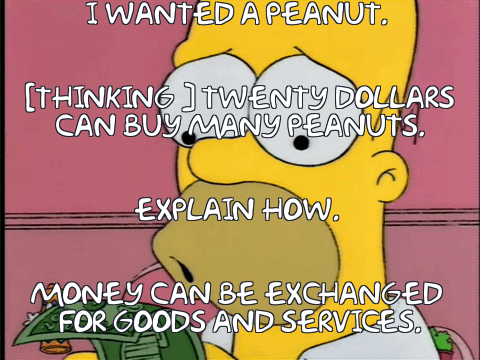“Both”
It’s real if you don’t have enough, but pretend if you have too much.
It is real because everyone pretends it is.
The only reason we pretend that money is real is because of the Chinese having a big brain idea that it’s more convenient to trade conceptual values, than having to exchange literal five chickens for one cow; one and a half cow for a table; and a table for a room in an inn for one night.
deleted by creator
It’s pretend, but everyone is forced to get in on it
It’s pretend, but the people pretending are the ones who can arrest you if you don’t declare income and pay taxes in their made-up currency.
Money isn’t real but the idea everyone agrees on subconsciously is it is a medium of exchange.
You have a goat and I have 50 apples. You want my apples but I don’t want your goat. OK. Bye bye, good luck finding the next customer.
Or
Sell the goat for the value of 50 apples, and then I can turn that into the new lamp I wanted instead.
Not everyone wants a goat but if you can float the value of something as an IOU (cash) then it’s useful.
Same reason why people like crypto, it’s the idea of cash but with math securing it’s scarcity vs guns and vaults of gold.
You have a goat and I have 50 apples. You want my apples but I don’t want your goat. OK. Bye bye, good luck finding the next customer.
In the real world:
Ok, I’ll let you have my apples, but you owe me.
Or
You want some apples? Sure, have some!
The world operated on debt and gifts for a long time before monetary systems were common. Debt was sometimes formal, sometimes informal. Gifts were sometimes pure acts of generosity, sometimes they were rituals.
Maybe that worked when you knew everyone in town or that they’d be where you can find them again, but not in a global economy. You can’t lend Joe Random 3 goats and he will pay you back if he simply is in another country doing business or is in town for the weekend. Try getting in your car and telling a random shop you don’t have cash but you’ll pay them back. This logic goes out the window as soon as you involve strangers.
Try getting in your car and telling a random shop you don’t have cash but you’ll pay them back.
What do you think a credit card is?
I’m confused, your first post is about how we need to go back to bartering and personal debt one on one without involving banks or money, and now you are advocating credit cards? What’s the message here? Those are 2 different things.
I’m saying that bartering was never a real thing that happened, at least not on any large scale. I’m also saying that debt existed long before currency. So, this idea that there was a difficulty when someone had a goat and someone else had 50 apples, that wasn’t a real problem that ever happened.
Even once currency was fairly common, paying for 50 apples in currency was rare. Most of the time, things were handled using debt and/or gifts. For example, roman coins are common, but the number of coins actually in circulation in roman times was tiny compared to the size of the roman economy. That’s because the most common arrangement was debt, which was often paid back not in coin but by returning something that offset or canceled the debt.
deleted by creator
It’s as real as a word is.
I personally suspect that the belief that money is real is problematic, psychologically.
There are all sorts of experiments that show we treat money in our minds differently from most other things.
A famous example is that many people would think nothing of taking a ten cent pen from work, but would be abhorred at the idea of taking money, even ten cents, from petty cash and just keeping it.
An experiment has shown that, if you give people the chance to cheat for money, or to cheat for tokens that can be immediately exchanged for money after the experiment, they will cheat more for tokens, despite the fact that at that point, the tokens are technically a type of money.
So, this sort of thing makes me suspect that beliefs about money also influence our ethics and our mental proclivities. So maybe people who believe money is more real are more likely to hoard it or to have gambling problems.
If I steal a cheap pen, it’s because I wanted a cheap pen. There’s no deeper meaning to it. I’m not going to fence it for a fifteenth of a baguette at the bakery.
If I steal ten cents though, I break a much deeper taboo because money is by definition fungible. Why do I need the money, what am I going to use it for, and why didn’t I empty the cash register while I was at it? These are all worryingly open questions.
Furthermore I reject the premise that stealing 10 cents is functionally equivalent to stealing a pen worth 10 cents; if anything, the premise that these are equivalent depends on a very debatable modern consumerist idea that commodities are perfectly interchangeable for money and/or the belief in a “rational actor” that has never existed outside of economics classes. Sure that may have been be valid if I was in charge of doing a bulk purchase of pens (and even then people aren’t as rational as economists would like but I digress). These economics concepts are all too theoretical to apply to individual actors in everyday life.
That pen is “worthless” to my employer (at least in my mind) and simultaneously worth a lot to me; I wouldn’t part with it for 10 cents or even 1 euro because that wouldn’t be worth the inconvenience of not having a pen, or simply because the idea of someone wanting to buy something I own and didn’t intend to sell is offensive to me.I do agree with the basic premise that we treat money as special, but to me that’s a natural and rational consequence of its fungible and abstract nature. It’s much weirder to consider physical objects to be fungible IMO (even if it makes sense on an abstract level for commodities), and that’s why the sentence “you’ll own nothing and be happy” induces so much existential dread despite being based on theoretically sound economic principles. I don’t care if it’s actually cheaper or more resource efficient, I’m not buying a subscription to my woodworking tools or selling my house. I like the psychological safety of owning things.
That part about rationality is huge. Far too many people believe that something costs an amount because it is worth that amount, and far too many people believe that something “is worth what someone will pay for it” while neglecting concepts like advertising and propoganda. So many things in this world cost far more than they should and wages are getting, relatively speaking, lower each year while those aforementioned costs rise and where’s the rationality in that? And all while people use that same belief to justify to themselves why a billionaire has “earned” their hoard.
It’s our biggest flaw, economically speaking and in my opinion, that we judge someone based on the money they have and not how they may have gained or lost it. A parasite with millions “must be pretty smart” and a hard worker out of a job “must just be lazy”.
I’ve never heard people say that someone with money must be pretty smart.
Is that something American?
I don’t know where you’re from but yes, Canadian and American conservatives at the very least are positive that if you don’t have money it’s because of your deliberate choice to make stupid decisions and if you have money it’s because you earned it. Generational wealth is a foreign concept to them and they detest the idea that maybe “unskilled” service jobs should also get a living wage. When they themselves don’t have much money though it’s because of taxes or woke-ism and also they’re smart for living out in the country where things are cheaper despite those places being cultureless hell-holes far from people’s families and friends.
It’s a way to justify their hatred toward poorer people and to not have to address the fact that maybe these rich people, including their own bosses, are taking them for a ride. Those comments pop up whenever someone who actually has a spine stands up for themselves and demands fair pay, probably because they hate themselves for being boot-licking cowards unable to do the same, but sometimes also because they make money for just being lucky that they had an interest in [high-paying field] and believe that actually they’re uniquely smart.
It’s fucking tiring.
From the movie ‘The Magic Christian.’
Billionaire puts a swimming pool full of manure, blood, and other offal in the middle of the London financial district.
See what happens.
If you don’t want to click it, he spray paints “ free money “ on the side of the swimming pool, and then begins to put stacks of money in the disgusting pool and the financial business man in their suits still choose to wade through the muck for the money.
Who wouldn’t want to see a bunch of rich guys debase themselves?
It’s real as in it has physical form, but the value attributed to it is playing pretend that everyone just agrees to go along with.
“why?”
deleted by creator
“Because it’s a lot easier to use paper and coins to exchange for goods and services than just about anything else.”
“why?”
Paper and coins smaller than cow and chicken.
Yeah, I feel like this one wouldn’t be hard for a child to grasp.
“why?”
“Just because!”

“Because asphinctersayswhy.”

“Woo-hoo!”
That is exactly what I was thinking of when I wrote “goods and services.”
I accept green pieces of paper for my not so hard work. It’s real as long as we all pretend its real.
No it’s not, but if you don’t have any it will destroy your life.
removed by mod
People existed before money, and they can exist after it.
Depending on how you define “people”…
And depending on how abstract you accept “money” to be, no reasonable definition of “people” will suffice.
Fiat currency is as real as the law (and all the baggage and corruption that entails).
Crypto is “Trust me, bro! I keep a spreadsheet in the cloud!”
We’ll all be using bottle caps soon enough.
Yes, even though “as real as the law” is a pretty complicated issue.
Actual money is real in the sense that it’s what people use to pay taxes, and if you don’t pay taxes the government has the right and the power to put you in prison. It’s also what the government is willing to offer people to do things like serve in the military, build highways, etc. That means there’s a vast and stable supply and demand for it.
Cryptocurrency is “real” in the sense that sometimes it’s the only way to pay a ransomware ransom. But, the people receiving that ransom are almost certainly going to change it into real money, because they’re probably not paying off ransomware ransoms, and so they don’t really have any use for cryptocurrency.
They might buy some drugs though.
Maybe, but they’re already criminals, they might already know other criminals who sell drugs. If so, it’s probably easier just to cash out the cryptocurrencies and pay for those drugs in cash.
It’s as real as everyone is willing to pretend.
The original network effect, bitches.
If money isn’t real, then nothing is real, because money can buy you anything. Maybe not a good lesson for a 4 year old but that doesn’t make it untrue.









